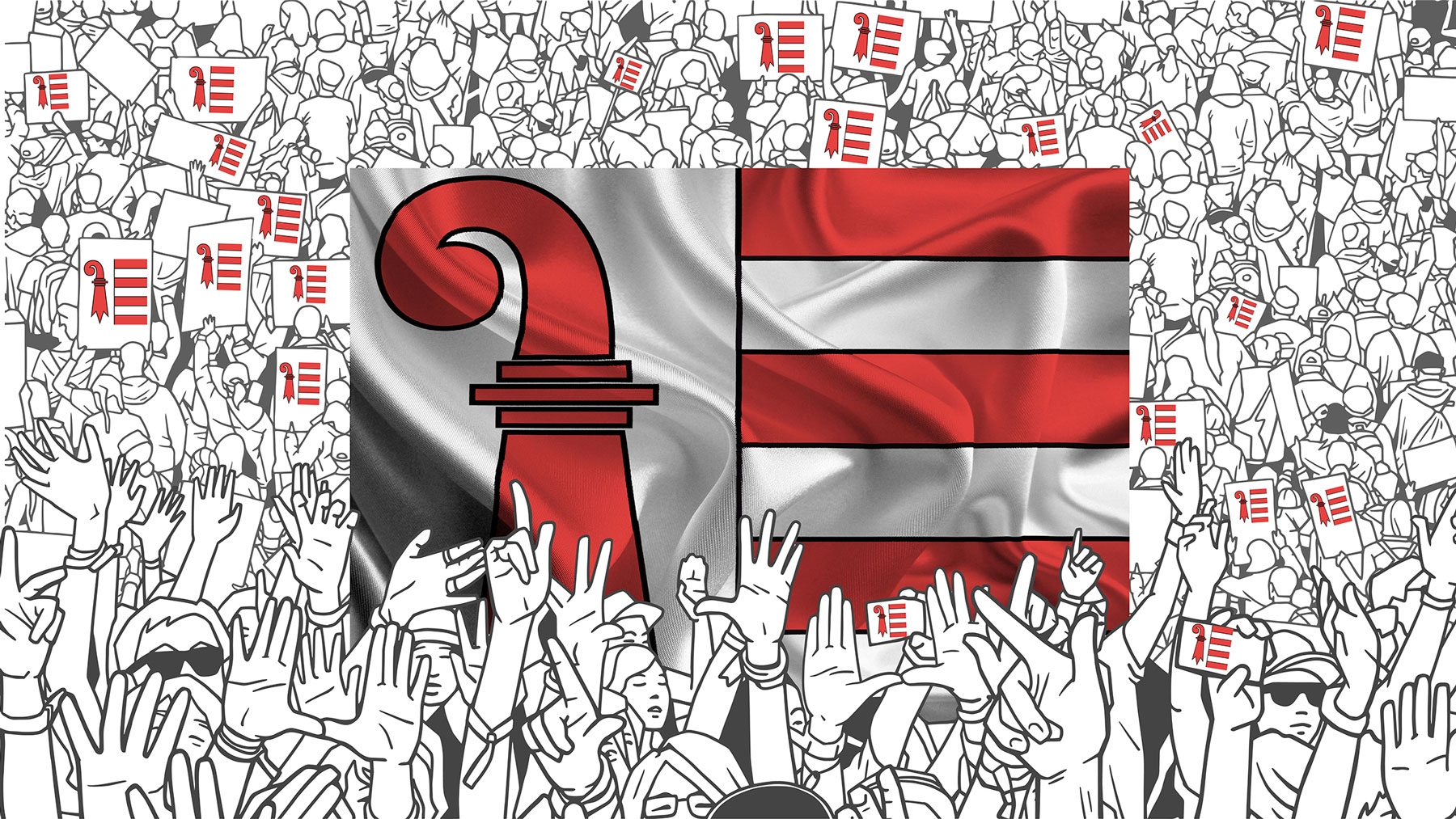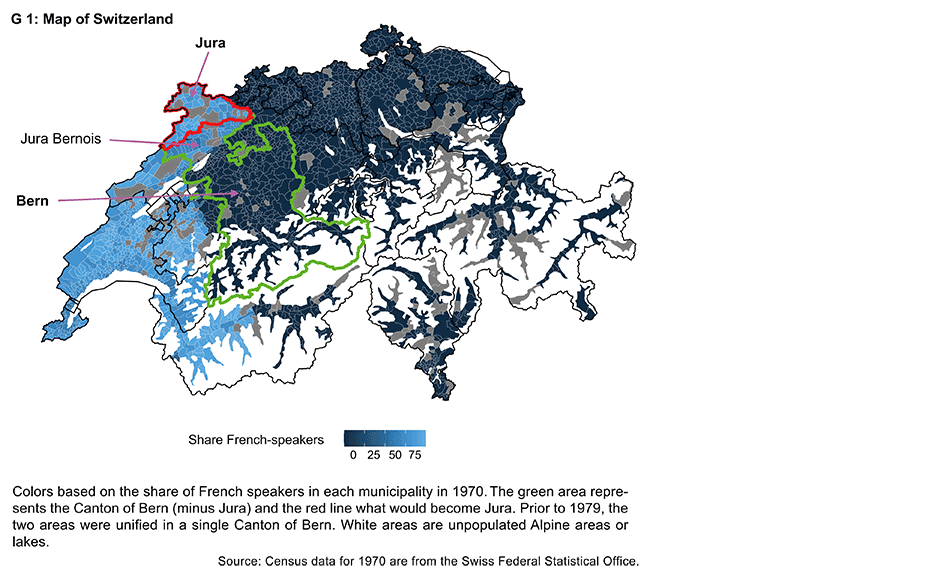Vera Eichenauer: “Power is a big issue”

In her working paper entitled ‘Power Shifts, Emigration, and Population Sorting’ co-authored with political scientist Michaël Aklin, KOF economist Vera Eichenauer analyses the shift in power relations by using the example of the Swiss canton of Jura. In this interview she explains her key findings.
Why are power shifts, i.e. the shifting of power relations in a society, interesting and relevant from a research perspective?
Power has always been a major topic in the social sciences. One highly contested question is who can determine in which direction a community should evolve. All countries of the world contain social groups with different political preferences and thus face a constant struggle over which political preferences can be asserted. The issue of permanent changes of power is also highly topical. In many regions of the world – be they Catalonia, Scotland, Kashmir or Kurdistan – groups are currently demanding more regional autonomy.
“All countries of the world contain social groups with different political preferences and thus face a constant struggle over which political preferences can be asserted.”Vera Eichenauer
How do power shifts come about?
In a democratic system, power shifts constantly and peacefully through elections, but not permanently – only for one or more electoral periods. We look at permanent shifts in power relations in our working paper. This can happen through an expansion of the right to vote, for example by introducing women’s suffrage or lowering the voting age. With different political preferences of groups gaining more influence, such permanent shifts in power relations also have permanent effects on the political development of that community, which can then in turn have effects on the population composition through voluntary migration.
Could you explain this by giving an example?
South Africa is a prominent example of a power shift. Until 1994, a small minority – the white population – held power. The black population was hardly allowed to have a say. With the end of apartheid, the balance of power in South Africa shifted for more than a few electoral periods, prompting many white South Africans to emigrate.
Can a power shift also be caused by violence?
Yes, but we did not analyse this case for methodological reasons. When violence is involved, minorities – and sometimes majorities – often leave the place for safety reasons. This is not directly related to new power relations or political preferences, but simply to fear of terror and violence. For methodological reasons we could not control for this further reason for emigration, which is why we deal exclusively with peaceful power shifts.
What options do individuals have in response to a power shift?
Following the American economist Alfred Hirschmann, they have three options. They can resist the power shift with political activism and in elections and votes. Hirschmann calls this mode ‘voice’. Secondly, individuals can move and leave the place. Hirschmann calls this reaction ‘exit’. The third option – in Hirschmann’s terminology, ‘loyalty’ – is to simply stay and engage with the power shift. We use these terms in our working paper to analyse the power shifts in the Swiss canton of Jura from the German-speaking population to the French-speaking one in the 1970s.
Why is the canton of Jura so suitable for a case study on power shifts?
Until 1979 the territory of the canton of Jura belonged to the canton of Bern with a historically dominant German-speaking majority. Since then, Jura has been independent with a French-speaking majority (see chart G 1). Compared with other secessions there was very little violence during the power shift in the canton of Jura. The power shift took place through several democratic votes in the 1970s. From a methodological point of view it is also nice to have Bernese Jura, which still belongs to the canton of Bern and serves as a kind of natural experiment as a control group, albeit an imperfect one.
What is the key finding of the study?
The population of Jura has become more homogeneous as a result of the secession. The French-speaking majority has become larger than the general trend would have suggested because many German-speaking residents have left voluntarily. According to our calculations, German-speaking residents were seven percentage points more likely to leave the canton of Jura than German-speakers in other cantons and than French-speaking residents in the canton of Jura.
“The population of Jura has become more homogeneous as a result of the secession. The French-speaking majority has become larger than the general trend would have suggeste.”Vera Eichenauer
Why have so many German-speakers moved away?
We cannot say exactly why. However, we think that many German-speaking residents did not want to be a linguistic, political and cultural minority in their own canton. German-speaking residents have different socio-cultural identities and different political preferences than French-speaking residents. The former tend to be more conservative and want a lean state. They obviously felt uncomfortable in the new entity.
Is voluntary departure actually good for society as a whole in certain circumstances because homogeneous communities have fewer conflicts and more social peace?
Yes, that tends to be the case. There is an extensive literature on the question of what is the optimal size for a country or political entity. According to these sources, the inhabitants of small, homogeneous entities without major conflicts often live more contentedly. But there are also many studies that show that diversity and cultural difference are good for economic growth. It is important that institutional mechanisms exist to integrate minorities and listen to their preferences. The federal state of Switzerland – with its three levels of government – is the best example of this.
Can the findings from the Jura study also be applied to power shifts in other countries?
Yes. A fundamental insight is that when there are other majorities, it is not only power that shifts but also the composition of the population. A prominent example of this is Brexit. Many EU citizens left the UK voluntarily after the majority of Britons voted to leave the European Union.
The working paper entitled ‘Power Shifts, Emigration, and Population Sorting’ by Vera Eichenauer and Michaël Aklin is available external pagehere.
Contacts
Professur f. Wirtschaftsforschung
Leonhardstrasse 21
8092
Zürich
Switzerland
KOF Bereich Zentrale Dienste
Leonhardstrasse 21
8092
Zürich
Switzerland


